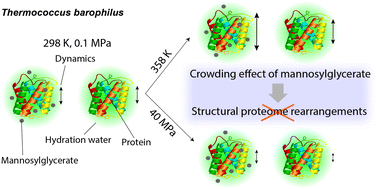The first study on the impact of osmolytes in whole cells of high temperature-adapted microorganisms†
Abstract
The hyperthermophilic piezophile, Thermococcus barophilus displays a strong stress response characterized by the accumulation of the organic osmolyte, mannosylglycerate during growth under sub-optimal pressure conditions (0.1 MPa). Taking advantage of this known effect, the impact of osmolytes in piezophiles in an otherwise identical cellular context was investigated, by comparing T. barophilus cells grown under low or optimal pressures (40 MPa). Using neutron scattering techniques, we studied the molecular dynamics of live cells of T. barophilus at different pressures and temperatures. We show that in the presence of osmolytes, cells present a higher diffusion coefficient of hydration water and an increase of bulk water motions at a high temperature. In the absence of osmolytes, the T. barophilus cellular dynamics is more responsive to high temperature and high hydrostatic pressure. These results therefore give clear evidence for a protecting effect of osmolytes on proteins.



 Please wait while we load your content...
Please wait while we load your content...